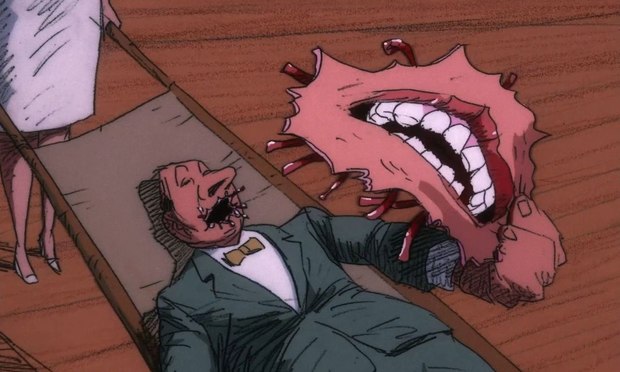The acclaimed animator celebrates his deal with the multi-platform media company, talks about his latest work, and tells a very scary horror story.
For those who believe that the more wackiness and mayhem there is in the world of animated entertainment, the better, Shout! Factory’s acquisition of the complete Bill Plympton library will come as welcome news. Encompassing all seven of Plympton’s hand-drawn feature films and over 50 of his shorts (including the Academy Award-nominated Your Face and Guard Dog), the deal gives the multi-platform media company digital and broadcast rights in North America. Shout! Factory plans a strategic launch of the titles across multiple entertainment platforms starting later this year.
“Bill Plympton is one of the most distinctive artists in the world” said Jordan Fields, Vice President of Acquisitions at Shout! Factory. “His unique visual style and subversive sense of humor are a testament to the wickedly creative sensibility that has earned him both critical celebration and a rabid following.”
On the off chance that you aren’t one of the rabid followers and are not familiar with his work, Bill Plympton has been a singular force in the world of indie animation for over 30 years. Prior to making his first animated short, Boomtown, in 1983, he won acclaim as an illustrator and nationally syndicated cartoonist. Since then, his work has ranged from commercials and music videos to full-length animated features, and his clients have included Kanye West, "Weird Al" Yankovic, The Simpsons, Ford Motor Company, United Airlines, Geico, Taco Bell and AT&T. His work has aired on MTV, Fox, Cartoon Network and Nickelodeon, and he has been featured in countless film festivals.
After years of struggling to secure distribution for his films (often one theatre at a time), Plympton is looking forward to having his library in the hands of an established company that can put some muscle into promoting his work.
“I'm basically an artist and that's what I do best,” Plympton said, in explaining his decision to team up with Shout! Factory. “My dad was a banker, and unfortunately, his business acumen never rubbed off on me. So I could never do pitch sessions or business meetings as successfully as others.”
If any media company is in a position to successfully market Plympton’s distinctive style and skewed world view, it’s Shout! Factory. Founders Richard Foos, Bob Emmer and Garson Foos have spent their careers sharing their music, television and film favorites with discerning consumers, and Shout! is dedicated to the causes of cultural preservation and commercial reinvention.
“My studio lacked the talents for promoting and selling my films,” notes Plympton. “With Shout! Factory’s history of supporting indie and avant-garde animation, I’m excited to work with them to share my features and shorts with animation enthusiasts and film buffs, as well as introduce these works to a new generation of fans.”
Having established that his past glories were in good hands, Plympton went on to talk a bit about his current undertakings. Shockingly, they were all somewhat unconventional. “I'm actually now working on my next feature, Slide, a western musical comedy, and I'm about a quarter through with production. Plus, I'm working on an animated feature with the great Whoopi Goldberg about her life. Also, I have a series that I'd love to produce for the internet. It's called Tiffany the Whale, and it's about a very large whale trying to make it in the high-fashion modeling business.”
When asked if we might expect some kind of collaboration in the future with an entity like Netflix or Comedy Central, Plympton demurred. “As I said previously, I totally suck at pitching. Plus, it all happens out in L.A., and it's a big hassle for me to visit those studios for a long shot—because they don't believe in handmade films, they mostly want computer-made films.”
While he remains a traditionalist in terms of production, Plympton is delighted with the shift to digital platforms. “I love the digital revolution!” he revealed. “Before the digital platforms, I would have to spend about 80% of my budget on the technology of my films—film stock, labs, sound studios, mixing houses, etc. Now, about 5% of my costs go into the technology and that means 95% goes to the artists and artistry of my animation.”
With Halloween approaching, we decided to wrap up the interview by asking Plympton—many of whose films include themes and/or scenes of a potentially disturbing nature—if he had any horror stories he could share. After all, the life of an indie animator is no bed of roses. There must have been some production screw-up, or horrible misunderstanding, or unexpected encounter with a zombie. Actually not. But there was this:
“I was screening Hair High [a 2004 feature voiced by Sarah Silverman, Dermot Mulroney and Keith Carradine, among many other luminaries] in a Seattle indie cinema. And as I was waiting out in the lobby getting ready for my Q&A, all of a sudden I heard massive amounts of screaming coming from the room. Now, Hair High does have a number of gory sequences, so I kind of felt good that the audience was responding so well to the film. But the horrific screaming continued and soon masses of people rushed out the screening room doors. ‘Wow,’ I thought, ‘my horror scenes must be killing it!’”
“But the running audience members kept pointing into the theater, so I fought the rushing crowd to enter the cinema, and there was a guy standing on his seat, his pants down, and he was waving his peeing member back and forth, like a lawn sprinkler. The ushers finally escorted him out of the cinema and—surprisingly—no one wanted to return to their seats. Go figure.”
“The screening was cancelled,” the director added. “Yet I like to believe that Hair High was such an emotional, cathartic film that some people just let their bodily functions go wild.”














